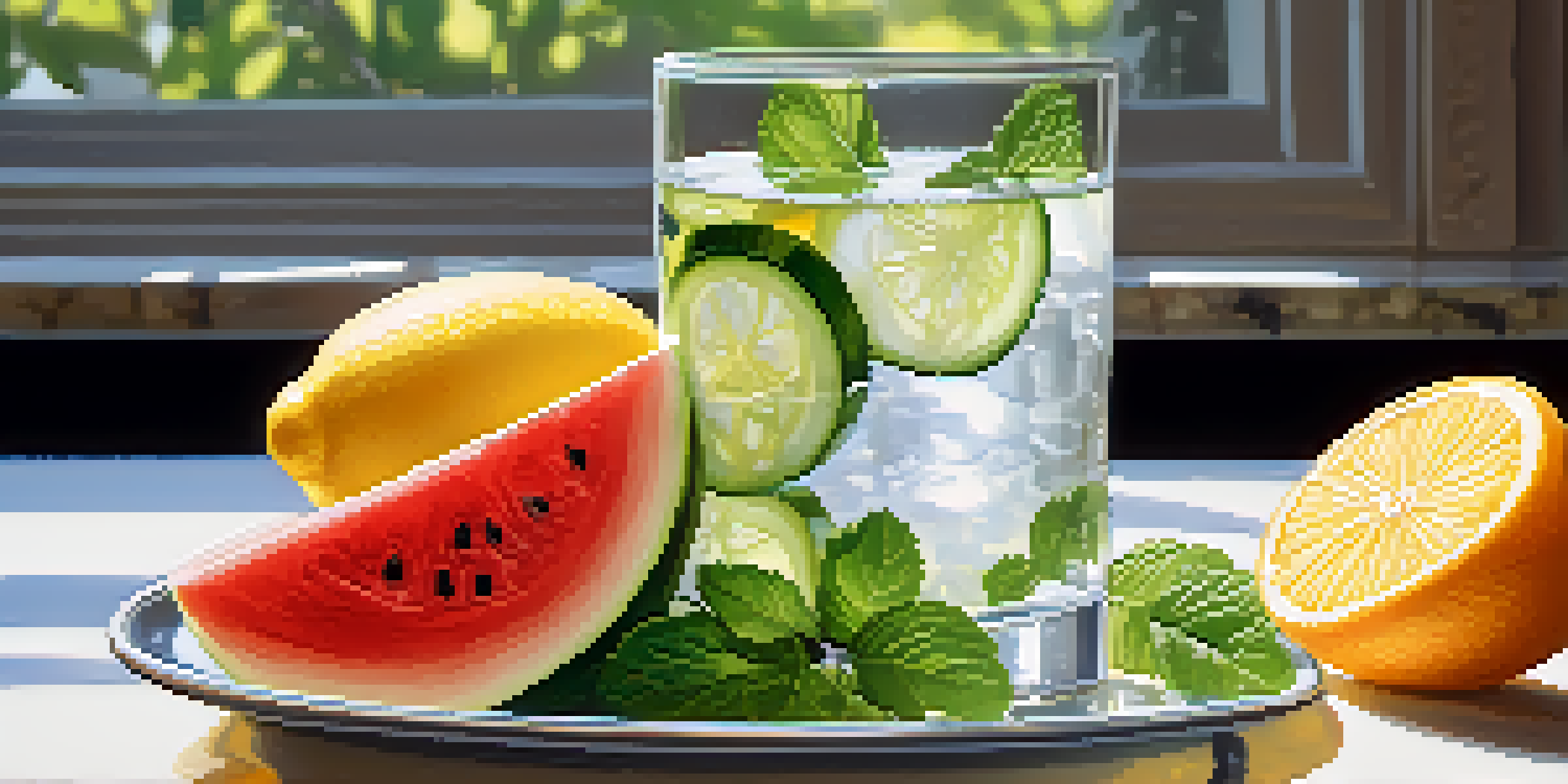The Impact of Diet on Skin Health and Appearance

Understanding the Skin-Diet Connection
The skin is the body's largest organ, and what we eat can significantly impact its health. Just like how fuel affects a car's performance, our dietary choices influence how our skin looks and feels. Nutrient-rich foods can provide the building blocks our skin needs to stay vibrant and youthful.
Let food be thy medicine and medicine be thy food.
When we consume a balanced diet, we are more likely to see improvements in skin elasticity, hydration, and overall appearance. Conversely, a diet high in processed foods and sugars can lead to inflammation and breakouts, almost like throwing sand into the engine of that car we mentioned.
Understanding this connection sets the stage for making informed choices that can enhance skin health. By recognizing the link between our plates and our complexions, we can start to take steps toward healthier skin.
Essential Nutrients for Glowing Skin
Certain nutrients play a crucial role in maintaining healthy skin. Vitamins A, C, and E, for example, are known for their antioxidant properties, which help protect skin cells from damage. Including fruits, vegetables, and healthy fats in your diet can ensure you're getting these essential vitamins.

Omega-3 fatty acids, found in fish and flaxseeds, are also vital for skin hydration and reducing inflammation. Think of them as the oil that keeps your skin's engine running smoothly, preventing dryness and irritation.
Nutrition Boosts Skin Health
A balanced diet rich in essential nutrients enhances skin elasticity, hydration, and overall appearance.
Moreover, minerals like zinc and selenium support skin repair and protection. By focusing on a nutrient-rich diet, you can create a solid foundation for a radiant complexion that feels as good as it looks.
The Role of Hydration in Skin Health
Hydration is often overlooked but is essential for skin health. Drinking enough water helps maintain skin elasticity and suppleness, much like how a sponge retains moisture. When our bodies are well-hydrated, our skin appears plumper and more youthful.
The skin is a reflection of what’s going on inside the body.
In addition to drinking water, incorporating water-rich foods like cucumbers, oranges, and soups can enhance hydration levels. These foods not only quench thirst but also provide added nutrients that benefit the skin.
Dehydration, on the other hand, can lead to dryness and a dull complexion. By prioritizing hydration, you can nourish your skin from the inside out, ensuring a healthy glow.
Foods to Avoid for Better Skin
Just as there are foods that promote healthy skin, there are those that can detract from it. Processed foods high in sugar and unhealthy fats can lead to inflammation, which often manifests as acne or other skin issues. Imagine trying to build a sturdy house using flimsy materials; the results won’t be pretty.
Dairy products have also been linked to breakouts in some individuals, potentially due to hormones present in milk. For those prone to acne, reducing dairy intake might be a beneficial experiment.
Hydration is Key for Radiance
Staying hydrated and consuming water-rich foods is vital for maintaining skin's suppleness and youthful glow.
Additionally, excessive salt can dehydrate the skin, making it appear less vibrant. By steering clear of these skin-damaging foods, you can create a more favorable environment for your skin to thrive.
The Power of Antioxidants for Skin Protection
Antioxidants are your skin's best friends when it comes to fighting free radicals. These unstable molecules can cause premature aging and damage, much like rust eats away at metal. Foods rich in antioxidants, such as berries, dark chocolate, and green tea, can help neutralize these harmful effects.
Incorporating a variety of colorful fruits and vegetables into your meals ensures that you’re getting a wide range of antioxidants. Think of your plate as a canvas—more colors mean a more beautiful masterpiece.
By regularly consuming antioxidant-rich foods, you can enhance your skin's resilience and maintain a youthful glow. This simple dietary adjustment can lead to long-lasting benefits for your skin's health.
The Impact of Gut Health on Skin
There's a fascinating connection between gut health and skin appearance, often referred to as the gut-skin axis. A healthy gut supports nutrient absorption and helps eliminate toxins, which ultimately reflects on our skin. When our digestive system is balanced, we're more likely to experience clear and radiant skin.
Incorporating probiotics found in yogurt, kefir, and fermented foods can promote a healthy gut microbiome. Think of probiotics as friendly bacteria that keep your gut happy and, in turn, help your skin shine.
Avoid Processed Foods for Glow
Limiting processed foods, sugars, and dairy can prevent inflammation and breakouts, promoting healthier skin.
Conversely, an unhealthy gut can lead to skin issues like eczema and acne. By nurturing our gut health through diet, we can indirectly enhance our skin's health and appearance.
Creating a Balanced Diet for Healthy Skin
To achieve glowing skin, it’s essential to adopt a balanced diet that includes a variety of food groups. Incorporating whole grains, lean proteins, healthy fats, and plenty of fruits and vegetables can provide your skin with the nutrients it craves. Think of it as building a diverse team where each member contributes to the overall success.
Meal planning can be an effective strategy to ensure you’re getting the right nutrients daily. By preparing your meals ahead of time, you can avoid the temptation of reaching for unhealthy snacks that can impact your skin negatively.

Remember, consistency is key. Making small, sustainable changes to your diet can lead to significant improvements in your skin's health over time, allowing you to enjoy the benefits of your efforts.